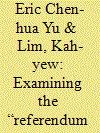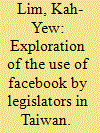| Srl | Item |
| 1 |
ID:
180697


|
|
|
|
|
| Summary/Abstract |
This paper analyzes the extent to which the performances of local and national governments can shape local election outcomes. Specifically, we use various waves of survey data from Taiwan’s Elections and Democratization Studies (TEDS) to explore whether a person’s assessments of local and central government performances affect his/her vote for the incumbent party candidate. Our empirical findings partially verify the so-called “referendum theory” and can be summarized as follows: First, voters who hold a positive assessment of the performance of local government are more likely to vote for an incumbent who seeks reelection, but this is not necessarily the case for an incumbent party candidate in an open-seat contest. Second, Taiwan’s local elections cannot be regarded as referenda on the central government because the central government approval rating does not consistently affect vote choices across different types/levels of local elections.
|
|
|
|
|
|
|
|
|
|
|
|
|
|
|
|
| 2 |
ID:
162612


|
|
|
|
|
| Summary/Abstract |
Previous studies have found that how to win an election is always an important question for legislators. Their behavior in lawmaking and constituency service is also associated with their aspirations for re-election. In the era of booming social media, how legislators can use social media to increase their chances for election and re-election has become a compelling issue. This study argues that legislators do indeed maximize the benefits of social media to win elections. On this account, this study intends to explore two main questions: (1) What kind of messages legislators choose to convey to voters on their fan pages; and (2) Whether the political characteristics of legislators affect the types of the messages they convey there. In this study, posts were collected from the fan pages of 25 Taiwanese legislators. These text messages were then converted into numerical data that could be quantitatively analyzed with the content analysis method. It was found that legislators tend to start with soft messages in their communications with the public. They share some details of their daily schedules and everyday lives with their voters before they begin image building and posting political material. This study also found that the political characteristics of legislators, including their party membership, their status either as a district or proportional representation (PR) legislator, and their incumbency all affect the content of posts on their fan pages. For example, compared to Kuomintang (KMT) and Democratic Progressive Party (DPP) legislators who share information from their daily lives, New Power Party (NPP) legislators prefer to share only political information. PR legislators devote more attention than district legislators to criticizing the government on their fan pages. Incumbents are significantly less likely than challengers to share daily information, but more likely to share political information. This study found that the aforementioned differences have resulted from the many ways that different types of legislators use to increase their chances of winning an election.
|
|
|
|
|
|
|
|
|
|
|
|
|
|
|
|